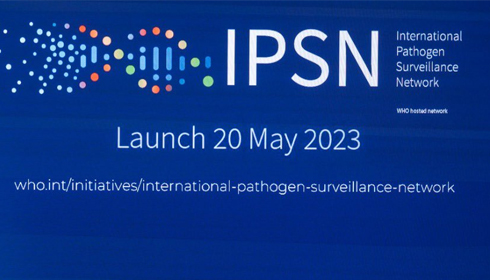
WHO launches International Pathogen Surveillance Network to combat infectious disease threats
In a bid to help protect people from infectious disease threats through the power of pathogen genomics, the World Health Organisation with its partners has launched a new initiative International Pathogen Surveillance Network (IPSN).
The initiative, a global network, is launched to provide a platform to connect countries and regions, improving systems for collecting and analysing samples, using these data to drive public health decision-making, and sharing that information more broadly, the United Health Agency announced in Geneva recently.
In a statement, the WHO pointed out that pathogen genomics examines the genetic code of viruses, bacteria, and other disease-causing organisms to determine how infectious, lethal, and contagious they are.
Scientists and public health officials can use this data to identify and track diseases to prevent and respond to outbreaks as part of a broader disease surveillance system, as well as create treatments and vaccinations, the statement added.
The secretariat of the network, based in Geneva at the WHO Hub for Pandemic and Epidemic Intelligence, will bring together experts from across the globe at the cutting-edge of genomics and data analytics, from governments, philanthropic foundations, multilateral organisations, civil society, academia and the private sector, sharing the common goal of detecting and responding to disease threats before they become epidemics and pandemics and optimising routine disease surveillance.
Pointing out that the goal of this new network is ambitious, WHO Director-General Dr Tedros Adhanom Ghebreyesus said, “But it (the network) can also play a vital role in health security, to give every country access to pathogen genomic sequencing and analytics as part of its public health system.
“As was so clearly demonstrated to us during the COVID19 pandemic, the world is stronger when it stands together to fight shared health threats,” he added.
Also Read:
| - Urgent increased investments needed to put health SDGs back on track: WHO |
The statement emphasised that COVID19 highlighted the critical role pathogen genomics plays in responding to pandemic threats and that without the rapid sequencing of the SARS-COV-2 genome, vaccines would not have been as effective or as quickly made available, and new, more transmissible variants of the virus would not have been identified as quickly.
The statement went on to say that the use of genomics in monitoring the spread of HIV drug resistance, for example, has led to antiretroviral regimes that have saved countless lives, and that genomics is at the heart of effective epidemic and pandemic preparedness and response, as well as part of the ongoing surveillance of a wide range of diseases, from foodborne diseases and influenza to tuberculosis and HIV.
“Global collaboration in pathogen genomic surveillance has been critical as the world fights COVID-19 together,” said Dr Rajiv J. Shah, President of The Rockefeller Foundation.
“IPSN builds upon this experience by creating a strong platform for partners across sectors and borders to share knowledge, tools, and practices to ensure that pandemic prevention and response is innovative and robust in the future,” he added.
The UN Health Agency said that despite the recent scale-up in genomics capacity in countries due to the COVID19 pandemic, many still lack effective systems for collecting and analysing samples or using those data to drive public health decision-making.
Pointing out that the situation is further aggravated by not enough sharing of data, practices, and innovations to build a robust global health surveillance architecture, WHO said that with budgets enhanced budgetary allocations during the pandemic that allowed a rapid build-up of capabilities are now being slashed, even in the wealthiest countries.
“Argentina is deeply invested in building our own country's capacity in pathogen genomics and the capacity of other countries,” said Josefina Campos, Director of the National Genomics and Bioinformatics Center at ANLIS Malbrán, Argentina.
Emphasising that diseases do not respect borders, she added, “A disease threat in one country is also a threat to others. We look forward to collaborating with IPSN members to achieve our common goal of preventing illness and saving lives.”
To create a collaborative system to better identify, prevent, and respond to disease risks, the IPSN seeks to address these difficulties through a worldwide network that connects geographic regions and disease-specific networks.
The participating members will collaborate in focused groups to address particular problems, for which IPSN will provide financial support to scale up pathogen genomics concepts and projects.
The IPSN will help to boost key capacity, elevate regional and national voices, and enhance their priorities by connecting nations, regions, and larger stakeholders, WHO informed.